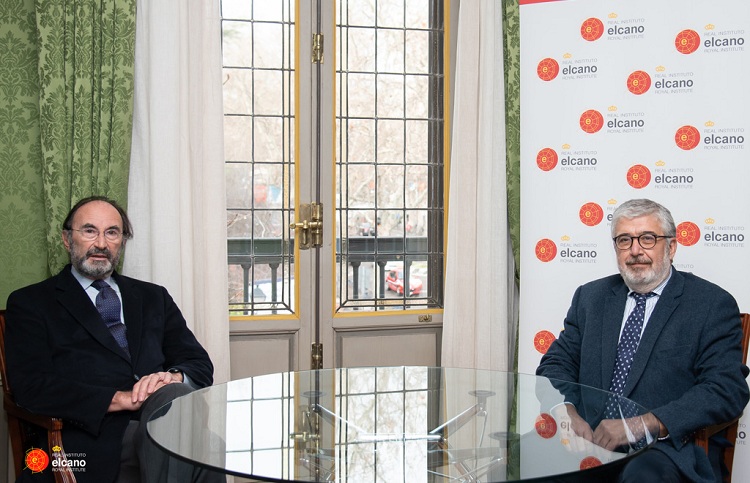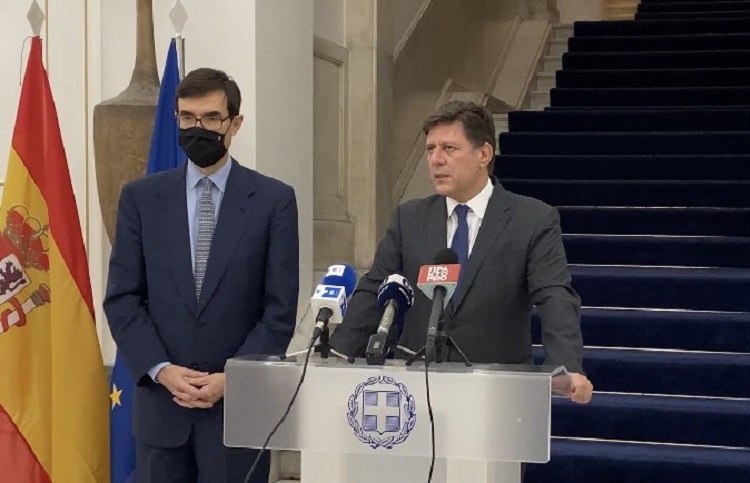Eduardo González
The Board of Trustees of the Elcano Royal Institute yesterday approved the appointment of the economist José Juan Ruiz as the new president of the institution, replacing Emilio Lamo de Espinosa, and the former Minister of Defense María Dolores de Cospedal for the position of non-executive vice-president.
The extraordinary meeting of the Board of Trustees was attended, among others, by Nadia Calviño, Third Vice-President of the Government and Minister of Economic Affairs and Digital Transformation; Arancha González Laya, Minister of Foreign Affairs; former Prime Ministers Felipe González, Mariano Rajoy and José Luis Rodríguez Zapatero; the former Minister of Foreign Affairs Marcelino Oreja; the former Minister, former High Representative of the EU and former Secretary General of NATO Javier Solana; the former Ministers of Defense Eduardo Serra and María Dolores de Cospedal; and various representatives of business and academia, as well as former presidents and heads of the Elcano Royal Institute (RIE).
After taking stock of his presidency, Emilio Lamo de Espinosa presented his resignation as president of the institution. As established in Article 10 of the Statutes, the appointment of the new president corresponds to the Board of Trustees at the proposal of a simple majority of the ex officio members, namely the four Ministries and the companies. Finally, a commission -chaired by Lamo de Espinosa and formed by Nadia Calviño, Arancha González Laya, the presidents of Telefónica, Santander and Iberdrola, José María Álvarez Pallete, Ana Botín and Ignacio Galán; and former presidents Felipe González and Mariano Rajoy – proposed the name of José Juan Ruiz, who, after receiving the endorsement of the Board of Trustees, became yesterday the fourth president in the history of the Elcano Royal Institute, after Eduardo Serra (2001-2005), Gustavo Suarez Pertierra (2005-2012) and Emilio Lamo de Espinosa (2012-2020).
José Juan Ruiz (1957), an economist from the Autonomous University of Madrid and State Commercial Technician, has been part of the Scientific Council of the RIE since 2012 and participated in several of its Working Groups, so he is very familiar with the institution. According to Elcano, the commission that proposed him had weighted “his career as a public servant in different positions of responsibility in the Ministry of Economy, Finance and Trade between 1983-1993, his experience in the national and international private sector as Chief Economist of Argentaria, AFI and, later, of Banco Santander in Latin America (1993-2012) and, finally, his work in multilateral organizations as Chief Economist and Director of Research at the Inter-American Development Bank in Washington between 2012 and 2018”.
In this regard, at the press conference following the Board of Trustees, Lamo de Espinosa stressed that “one of the assets that the committee valued very positively was his enormous research experience in economic and macroeconomic issues.” “He is a prestigious economist” whose appointment, he continued, will help strengthen the “area of international macro research”. “At the Elcano Royal Institute we have done economics, but it has not been the central theme and I think it should be in the future”, he added.
At the same press conference, Ruiz said that his appointment as president of the Elcano Royal Institute is a “great intellectual challenge”. “Throughout my professional life, if there is one thing that has characterized me, it has been to have tried to mediate between those who produce ideas and those who need them to manage them, something that I will continue to do at the Elcano Royal Institute”, he said. Another of his objectives, he added, is “to try to contribute a Spanish vision to the major issues on the global agenda”.
At the same meeting of the board of trustees, and at the proposal of the aforementioned committee, the appointment of María Dolores de Cospedal as non-executive vice president was approved, a decision that responds, according to Lamo, to the importance that the organization attaches to the defense and security agenda and to the “magnificent relationship” it has maintained since its origins with the Ministry of Defense, which Cospedal headed between November 2016 and June 2018.







